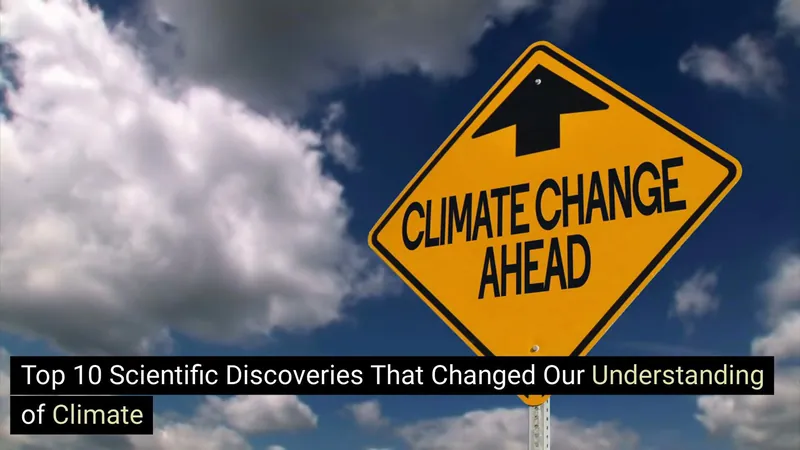
Top 10 Scientific Discoveries That Revolutionized Our Understanding of Climate Change
2024-12-25
Author: Jia
1. The Greenhouse Effect
First identified in the 19th century, scientists such as John Tyndall and Svante Arrhenius demonstrated how gases like carbon dioxide and methane trap heat in the Earth’s atmosphere. This phenomenon is now recognized as the primary driver of global warming.
2. Plate Tectonics
The theory explaining the movement of the Earth's lithospheric plates has revealed how geological processes such as volcanoes and earthquakes affect climate over millions of years, influencing everything from ocean currents to carbon cycling.
3. The Role of Ocean Currents
Research into oceanic systems, particularly the Great Ocean Conveyor Belt, has highlighted how currents distribute heat across the planet, having a significant impact on regional climates and weather patterns.
4. Climate Models
The development of sophisticated climate models has allowed scientists to predict future climate conditions based on various greenhouse gas emissions scenarios. These models are critical for understanding potential outcomes and informing policy decisions.
5. Ice Core Sampling
Analyzing ice cores from Greenland and Antarctica has provided valuable records of past climate conditions, revealing how temperature and CO2 levels have changed over the millennia, significantly enhancing our understanding of natural climate variability.
6. Anthropogenic Impact
Studies have increasingly shown how human activities, particularly the burning of fossil fuels and deforestation, are drastically altering the natural climate systems, leading to unprecedented rates of temperature increase.
7. Ocean Acidification
As carbon dioxide levels rise, oceans absorb excess CO2, leading to acidification that threatens marine ecosystems. This discovery underscores the interconnectedness of climate systems and biodiversity.
8. Feedback Loops
Research has illustrated how certain climate processes reinforce warming. For instance, melting ice reduces the Earth's albedo (reflectivity), causing more heat absorption and accelerating warming—a worrying positive feedback loop.
9. Paleo-climate Studies
Understanding past climates through pollen analysis and sediment studies has revealed how ecosystems respond to climate shifts, aiding predictions of future biodiversity and species migration under changing conditions.
10. Climate Justice
The growing recognition of how climate change disproportionately affects marginalized communities has spurred a new area of study. This discourse is vital for crafting equitable climate solutions that consider social justice alongside environmental sustainability.
Conclusion
In conclusion, these discoveries not only enhance our understanding of climate change but also emphasize the urgent need for global action. As we confront the realities of a warming planet, it is critical to engage with both the scientific community and policymakers to mitigate the impending crises affecting our environment, economy, and societies. The legacy of these scientific breakthroughs underscores the importance of continued research and innovation in the face of climate adversity.



 Brasil (PT)
Brasil (PT)
 Canada (EN)
Canada (EN)
 Chile (ES)
Chile (ES)
 Česko (CS)
Česko (CS)
 대한민국 (KO)
대한민국 (KO)
 España (ES)
España (ES)
 France (FR)
France (FR)
 Hong Kong (EN)
Hong Kong (EN)
 Italia (IT)
Italia (IT)
 日本 (JA)
日本 (JA)
 Magyarország (HU)
Magyarország (HU)
 Norge (NO)
Norge (NO)
 Polska (PL)
Polska (PL)
 Schweiz (DE)
Schweiz (DE)
 Singapore (EN)
Singapore (EN)
 Sverige (SV)
Sverige (SV)
 Suomi (FI)
Suomi (FI)
 Türkiye (TR)
Türkiye (TR)
 الإمارات العربية المتحدة (AR)
الإمارات العربية المتحدة (AR)